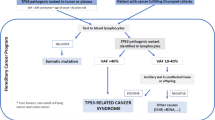Abstract
The Li–Fraumeni cancer predisposition syndrome is associated with germline TP53 mutations in the majority of families. We have investigated cancer incidence in 34 Li–Fraumeni families, according to their constitutional TP53 mutation status. Families with germline missense mutations in the core DNA binding domain showed a more highly penetrant cancer phenotype than families with other TP53 mutations or no mutation. Cancer phenotype in families carrying such mutations was characterized by a higher cancer incidence and earlier ages at diagnosis, especially of breast cancer and brain tumours, compared with families carrying protein truncating or other inactivating mutations (P=0.03 for all cancers, P=0.006 for breast cancers, P=0.05 for brain tumours). Proband cancers showed significantly younger ages at diagnosis in those with missense mutations in the DNA binding domain than in those with protein inactivating mutations (P=0.031). In individuals with the former type of mutation, there was a significantly lower proportion of tumours which showed loss of the wild-type TP53 allele (P=0.004). These results are consistent with observations in experimental systems which demonstrate that certain mutations exhibit gain of function and/or dominant-negative properties. Our results support an enhanced oncogenic potential for such mutations in human populations.
Similar content being viewed by others
Author information
Authors and Affiliations
Rights and permissions
About this article
Cite this article
Birch, J., Blair, V., Kelsey, A. et al. Cancer phenotype correlates with constitutional TP53 genotype in families with the Li–Fraumeni syndrome. Oncogene 17, 1061–1068 (1998). https://doi.org/10.1038/sj.onc.1202033
Received:
Revised:
Accepted:
Published:
Issue Date:
DOI: https://doi.org/10.1038/sj.onc.1202033
- Springer Nature Limited
Keywords
This article is cited by
-
Li-Fraumeni syndrome presenting with de novo TP53 mutation, severe phenotype and advanced paternal age: a case report
Hereditary Cancer in Clinical Practice (2024)
-
Dominant-negative p53-overexpression in skeletal muscle induces cell death and fiber atrophy in rats
Cell Death & Disease (2022)
-
Single loss of a Trp53 allele triggers an increased oxidative, DNA damage and cytokine inflammatory responses through deregulation of IκBα expression
Cell Death & Disease (2021)
-
Basal p53 expression is indispensable for mesenchymal stem cell integrity
Cell Death & Differentiation (2018)
-
Clinical implications of germline mutations in breast cancer: TP53
Breast Cancer Research and Treatment (2018)



